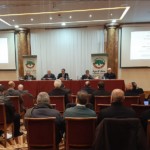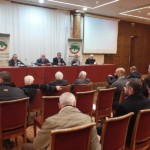To conduct its annual strategic evaluation of the various developments of the Palestine issue, al-Zaytouna Centre held a symposium on 9/12/2020, entitled “The Future Tracks of the Palestine Issue, at Ramada Hotel, Beirut.
Four experts discussed the future of Jerusalem, the possibilities of an Israeli aggression on Gaza, Lebanon and Syria, the impact of the international development on the Palestine issue, and the repercussions of the Lebanese crisis on the Palestinian refugees.
The first panelist was the Jerusalem expert and director of Al-Quds International Institution, Yassin Hammoud. In his paper, “Jerusalem and the Holy Sites: Futuristic Reading,” he reviewed the conditions of the holy city, and the struggles of Jerusalemites in defense of the religious, cultural and demographic identity of the city during 2019. Hammoud expects an escalation in the Judaization campaigns against al-Aqsa Mosque, and that Israel will endeavor to completely separate the West Bank into two parts and promote construction in settlements while building new ones.
Dr. ‘Abbas Isma‘il, university professor and Israeli affairs expert, presented the second paper in which he discussed the future developments of the internal scene in Israel, and pointed at the continuous political deadlock due to elections and the electoral law, in addition to the increase of extremism and decrease in social immunity. As for the prospects of war, Isma‘il stated that there is a high probability of war in the region, and if Israel and Hamas do not reach understandings on a long cease-fire, an aggression on Gaza is highly likely.
The third panelist was Jaber Suleiman, the Palestinian refugee affairs expert and the coordinator at the Lebanese Palestinian Dialogue Forum of the Common Space Initiative. His paper discussed the repercussions of the Lebanese crisis on the Palestinian refugees. At first, he explained the deteriorating economic conditions of the Palestinian refugees in Lebanon, pointing out the 2010 and 2015 surveys of the American University of Beirut (AUB) and the United Nations Relief and Works Agency for Palestine Refugees in the Near East (UNRWA), which found out that 65% of Palestine refugees from Lebanon live in poverty. He added that the decisions of the Lebanese Minister of Labor concerning foreign labor in Lebanon, have increased the suffering of Palestine refugees, especially when followed by the Lebanese crisis. He expects that the Palestinian emigration from Lebanon will increase and that international pressure would increase to settle the remaining Palestinians in Lebanon. There are fears that poverty, unemployment, misery, frustration would lead to widespread social and psychological problems, with the possibility of some parties trying to exploit people’s conditions and recruit unemployed youth for internal or external agendas.
The fourth paper was presented by the strategy expert and Secretary-General of the Palestinian Conference for Palestinians Abroad Munir Shafiq. He reviewed the developments on the international level, especially the US behavior in the region. Shafiq expects that the assassination of General Soleimani and his comrades would intensify the efforts of the resistance axis in order to get the US out of Iraq. He said that the US and Israel are in a declining state, which makes conflict enter a new stage.
In general, the symposium presented the prospects and potential developments of the Palestine issue, in particular, and the region, in general.






Leave A Comment